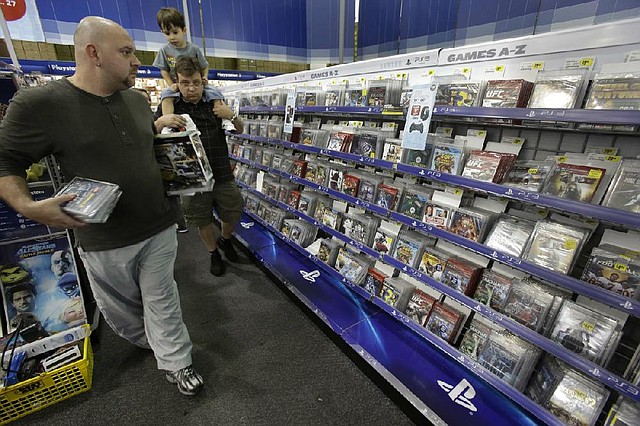Consumer spending jumps 0.4%
Americans’ salaries, wages climb $41 billion in November
Shoppers look for bargains Thursday in the video games section of a Best Buy store in Orlando, Fla. Consumer spending is on the rebound, a New York economist said.
Saturday, December 22, 2012
LITTLE ROCK — Consumer spending increased in November as Americans pushed aside the threat of higher taxes in 2013, bought gifts for the holidays and made up for lost shopping time caused by Hurricane Sandy.
The Commerce Department said Friday that consumer spending rose 0.4 percent compared with October. Personal income jumped 0.6 percent, the biggest gain in 11 months.
Economists noted that the spending and income growth in November was a healthy sign for the economy, especially in the midst of anxiety over federal budget negotiations in Washington.
“The numbers looks quite good,” said Thomas Julien, an economist at Natixis North America in New York. “We have clearly had a rebound in consumer spending.”
Wages and salaries rose $41 billion in November. Sandy had reduced wages at an annual rate of $18 billion in October. Spending had fallen 0.1 percent in October compared with September.
With income rising faster than spending, the saving rate rose to 3.6 percent of income in November. That was up from 3.4 percent in October.
Concerns have been rising that income growth has been too weak to support sustained increases in spending, especially when Americans are worried about possible tax increases in 2013.
Consumer spending is closely watched because it accounts for about 70 percent of economic activity.
A separate government report Friday showed that orders to U.S. factories for goods such as machinery and electronics climbed more than forecast in November, showing companies are planning to expand next year as they look beyond the tax increases and spending cuts planned to take effect.
Orders for durable goods increased 0.7 percent last month after a 1.1 percent gain in October that was larger than previously estimated, the Commerce Department said.
“The worst of the capital spending slowdown is over,” said Harm Bandholz, chief U.S. economist at UniCredit Group in New York. “Pent-up demand is building up right now. ... The economy should pick up momentum next year, in part driven by capital spending.”
“Despite concerns ... businesses appear to have boosted spending at year-end,” said Sal Guatieri, senior economist at BMO Capital Markets.
He said his forecast that the economy would grow at an annual rate of 1.5 percent in the October-December quarter might need to be revised higher.
Paul Ashworth, senior economist at Capital Economics, said that based on Friday’s reports, he’s revising up his estimate of growth for this quarter to an annual rate between 1.5 percent and 2 percent.
On Thursday, the government said the economy grew at an annual rate of 3.1 percent in the July-September quarter, more than twice the 1.3 percent growth rate from April through June. Part of the improvement came from a 1.6 percent increase in consumer spending, slightly better than in the spring.
But analysts think economic growth has slowed in the October-December quarter to an annual rate below 2 percent. Uncertainty about whether or how the fiscal cliff will be resolved has led some businesses to delay or reduce hiring and investment in major equipment.
Many economists expect no improvement in the January-March quarter. The latest forecast from a panel of 48 economists with the National Association for Business Economics is that the economy will expand at an annual rate of 1.8 percent in the first quarter of 2013.
Growth at that pace is considered too weak to significantly lower the unemployment rate, now at 7.7 percent.
But economists say growth could strengthen in 2013 if Congress and the administration resolve their budget debate in a way that doesn’t too drastically raise taxes or cut government spending.
The University of Michigan said Friday that its consumer sentiment index for December fell to 72.9, a sharp drop from the November reading of 82.7. The November figure was a five-year high.
“Confidence is lost much more easily than it can be regained,” said Peter Curtin, the University of Michigan’s chief economist for the survey. “Blaming one side or the other for failure will only increase pessimism as it reflects a dysfunctional system for setting economic policy.”
Chris Christopher, senior economist at IHS Global Insight, said the survey showed that “Americans have become increasingly worried over their personal finances, business conditions and the economic outlook.” Information for this article was contributed by Martin Crutsinger of The Associated Press and Alex Kowalski, Kristy Scheuble and Michelle Jamrisko of Bloomberg News.
Business, Pages 27 on 12/22/2012
